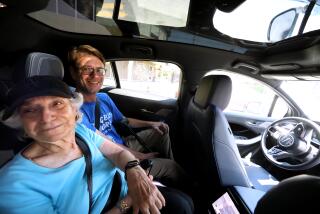Young ‘at’ Heart Learn to Get Wired
- Share via
PORTLAND, Ore. — “You know that old trees just grow stronger. And old rivers just grow wilder every day. Old people just grow lonesome waiting for someone to say, hello in there. Hello.”
--John Prine
*
PORTLAND, Ore.--It’s a familiar scene, but this time you won’t hear me scoffing. I’m looking into the recreation room at a busy high-rise. We have here a bank of glowing computers, the click-clack of keyboards, the synthetic sound effects and the hypnotized faces of people lost to the world around them.
A commonplace sight at offices, homes and Internet arcades. Except here, the tapping of keyboards occurs to the wound-down beat of an old clock. You’ve heard of dragging the mouse, and it really does drag in this case. The average age of these techno-heads I’m watching is 84.
One woman finishes her session and swivels slowly in her chair. She pauses for that necessary interval on the return trip from cyberspace. Bent over, she grasps for her walker, stuffs her morning printouts into an apron and shuffles off. Someone whispers that she is 101, one of the oldest graduates of one of the newest ideas in geriatrics: wiring up our parents, grandparents and great-grandparents.
What is viewed as a threat to our youth is proving to be a gift to our elderly, stimulating their minds, restoring their self-esteem, keeping them in The Now with friends and family.
I have pondered the “gray gap” before. The subject brought me here. But until I looked closely, I had not truly understood the dispiriting impact of the technology revolution on those left behind.
The biggest transformation of this era is occurring all around millions of older Americans, and they’re not part of it. Many blame themselves. Few of us have thought to help. Or if we tried, say, to get our parents connected, we often failed.
“This has been a big jolt to our entire culture. And there’s a whole generation of us who missed out.... It’s something when everyone else knows,” Josephine McWhirter tells me. She is 79, a star pupil of Spry Learning.
The Portland-based company teaches seniors, one step at a time, that computers aren’t so scary, so fragile or so incomprehensible.
“It’s been a revelation. It’s changed my whole life,” she beams.
You don’t hear that very often. At least from people who mean it. I’m happy to get it firsthand. Modern life has meant the isolation of our elderly, and now modern life has a way to help.
The Pew Internet and American Life Project has determined that only 15% of those over age 65 have used the Internet. Of those people who resolve never to go online, 81% are over age 50.
For Devin Williams, 30, a Harvard MBA and budding entrepreneur, this proved the opportunity for “social enterprise.” A onetime investment banker, she joined with a college friend two years ago to found Spry, www.Spry learning.com, to produce a computer literacy curriculum now used at retirement and assisted-living facilities in four states.
I met Williams at a dinner party a while back and casually mentioned that I’d given up on the idea that my retired parents would ever embrace technology.
The excuses that the elderly offer--and Williams has heard them all--are self-deprecating. I’m too old. I’m too stupid. I’m no good with gadgets. I’ll break the machine. Mostly, it’s fear and shame. And, often, a stubborn reluctance to learn from their children.
Williams invited me to come see what happens when can-do instructors slow down and begin with the basics. Such as, don’t worry if you press down on the keyboard too long and get a whole string of letters. See, you can delete them. Or, no, the spell-checker is not an actual person spying on you. In eight weekly classes, the elderly are taken from typing to e-mail. So far, Spry has devised 44 advanced classes on everything from games to managing stock portfolios, with more in the works.
“It’s been a godsend,” says Norman Barrow, 78, who now keeps in touch with family and friends via three different e-mail address books.
Because residents are enthusiastic, retirement homes like Portland’s Calaroga Terrace are now pitching the idea that “you’re never too old to surf.”
Speaking of never, I never thought I would say it: Sometimes there’s a friend in this ugly, one-eyed box on the table. If you’re over 75, send me an e-mail to john.balzar @latimes.com, and I’ll say, hello out there. Hello.






